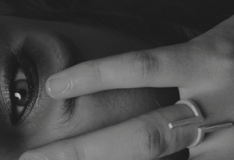
| Presented by |
When a 35-year old male walks into my office for the very first time with features of advanced glaucoma, my heart sinks as I realize that it is the lack of awareness that has contributed to his plight. It will be an uphill struggle from here to preserve his sight.
Glaucoma affects all ages from infants to the elderly. The earlier the onset of glaucoma, the worse the prognosis. There is a strong genetic basis to the disease and families with glaucoma should urge the younger members to get tested. We are increasingly realizing that all screening protocols should commence earlier than what was once thought. A person with a positive family history must start his regular visits to the optometrist by the age of 20 years. Glaucoma is more prevalent in short sighted (myopic) individuals and diabetics, in whom the screening should commence early.
 |
Leanr More or Book Your
|
|
Leaders and Specialists in Glaucoma, |
It is estimated that glaucoma affects more than 3 million Americans and only half of them are even aware of the condition. What makes it deadly is the fact that it produces no symptoms until very late in the disease.
There is overwhelming evidence in literature that early detection is one of the key factors in successful management of the condition.
African American have a six to eight fold risk of going blind from Glaucoma compared to Caucasians. A family history of glaucoma is by far the biggest risk factor for acquiring the disease. The entire prognosis changes when somebody is detected early on in the disease process avoiding sight threatening complications.
WHAT ARE THE GLAUCOMA SYMPTOMS TO WATCH FOR?
While there are different types of glaucoma, key symptoms to watch for are:
- Congenital glaucoma - children with a watery eye, red eye or a large eye
- Angle-closure glaucoma - recurrent episodes of pain, which tends to settle
- Open-angle glaucoma - there are typically no symptoms
The critical thing about glaucoma symptoms is for patients to know that it doesn’t always present with a symptom. Regular eye assessments if you are at risk is key.
HOW MUCH DOES GLAUCOMA TREATMENT COST?
Glaucoma is well controlled in a vast majority of patients with eye drops. In a minority, surgical options may need to be pursued. The cost to treat glaucoma is variable and will depend on the type of glaucoma you are diagnosed with and what treatment your doctor thinks will work best for you.
Treatments options:
- Eye Drops - cost can vary depending on the amount of drops you require, how often you need to use them and what your insurance will cover.
- Lazer surgery - Patients with insurance will usually have a large portion covered for the surgery and will only need to cover the co-pay (office fee) which can rnage from $100 to $300 depending on the procedure.
It must be emphasized that glaucoma is not synonymous with blindness and most patients are able to carry on with their normal lives. However, the key to management is early detection, good drug compliance and efficient monitoring using good time tested clinical methods and technology.






